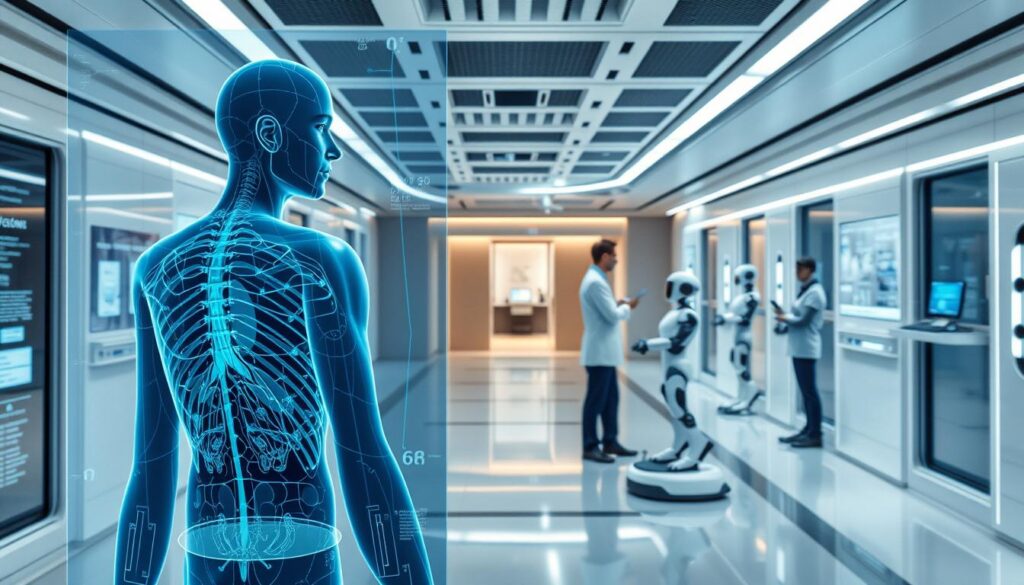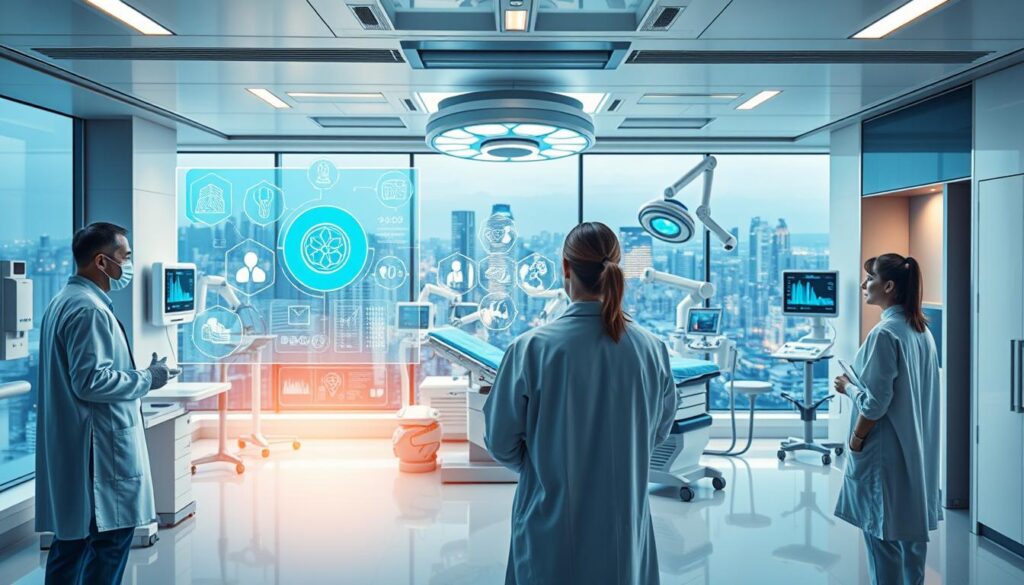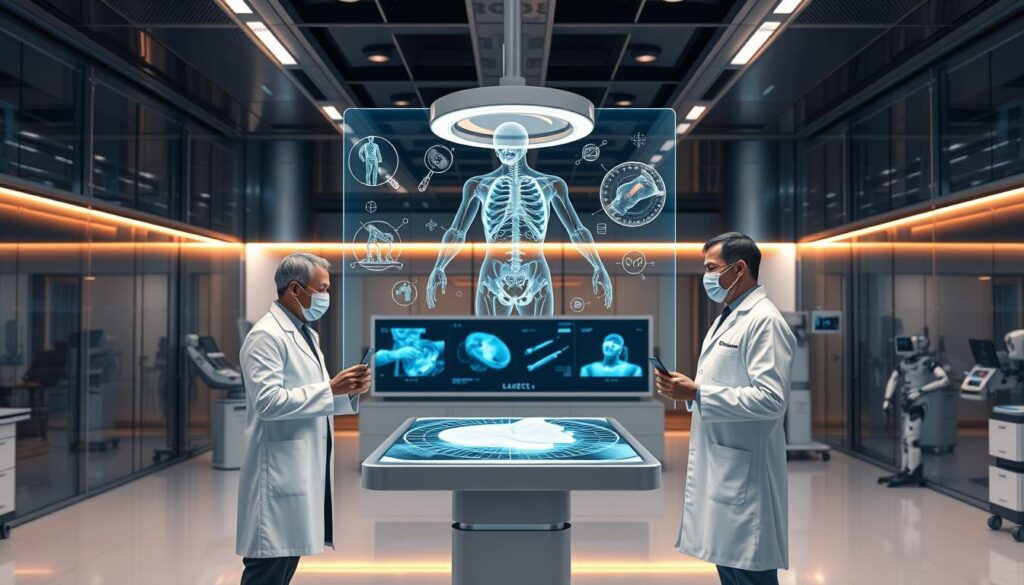10 Exciting AI in Healthcare Innovations With Proven Impact
15 min read
Table of Contents
Can artificial intelligence really change the healthcare world? The answer is yes, thanks to many new ideas already making a big difference in how we care for patients and do medical research.
Artificial intelligence in healthcare is here and now. It’s making diagnoses more accurate, making clinical work easier, and tailoring treatments to each patient.

The use of AI technologies in healthcare has brought about big improvements. From predicting health issues to helping with surgeries, these new tools are making patients healthier and saving money. They’re also making healthcare services more efficient.
The Transformative AI in Modern Healthcare
The healthcare field is approaching a major transformation. This change comes from using Artificial Intelligence (AI) in many parts of medical care. AI could help solve big problems like better health for more people, better care for patients, and lower costs.

The Urgent Need for Technological Solutions in Healthcare
The healthcare field is facing big challenges like high costs, inefficiencies, and more people with chronic diseases. AI technologies are being looked at as possible answers. With advanced data analytics and machine learning algorithms, doctors can make better diagnoses, work more efficiently, and help patients get better faster.
AI can make a big difference in several key areas:
- Predictive analytics for early disease detection
- Personalized medicine tailored to individual patient profiles
- Using automation to examine medical images and support diagnosis.
- Digital nursing assistants that help with patient care and tracking.
How AI Technologies Are Meeting Critical Medical Challenges
AI is being used in many ways to tackle healthcare’s big challenges. For example, AI-powered diagnostic tools can look at medical images to find problems like tumors more accurately and quickly than doctors can. Also, AI can predict which patients might get worse, so doctors can act early and save lives.
Using AI in healthcare is more than just getting new tech. It’s about changing how care is given. With AI, healthcare providers can make patients healthier, spend less money, and give better care overall.
AI in Healthcare: From Experimental Technology to Clinical Reality
Healthcare is changing fast with AI moving from an experimental tool to a key part of care. This change is thanks to big steps forward in ai healthcare technology. Now, we can care for patients more precisely and efficiently.
The Evolution of Healthcare AI Implementation
AI in healthcare has grown a lot, from early tests to now being used in clinics. Important steps include:
- Creating advanced algorithms for diagnosing diseases
- Using AI in electronic health records (EHRs) for better predictions
- Introducing AI chatbots for helping patients
These steps show the big benefits of ai in healthcare. They lead to better diagnoses and better care for patients.

Measuring Real-World Impact of AI Medical Solutions
We’re tracking how AI changes healthcare in real life. We look at things like:
- Less mistakes in diagnosis
- Better results for patients
- Healthcare running smoother
Research shows AI can really make healthcare better. It shows ai healthcare technology can change the way we see medicine.
Innovation 1: Google Health’s AI for Breast Cancer Detection
Google Health has created an AI algorithm for breast cancer detection. This uses machine learning to change how we find breast cancer. It’s part of a big shift in AI in healthcare that’s making diagnosis better.
How the Algorithm Outperforms Human Radiologists
Google Health’s AI for breast cancer detection is very accurate. It often beats human radiologists. The AI looks at mammography images with machine learning models to spot cancer signs.
Studies show this AI system can:
- Detect breast cancer with high accuracy
- Lower false positives and negatives
- Help radiologists make better choices
Implementation Results Across Medical Centers
Google Health’s AI has been used in many medical centers. The results are good. Key findings include:
- Better detection of breast cancer
- Improved patient outcomes from early detection
- More efficient work for radiologists and healthcare teams
These results show how AI in healthcare can make diagnosis and care better.
Innovation 2: IDx-DR – The First FDA-Approved Autonomous AI Diagnostic System
IDx-DR is a major step forward in AI in healthcare. It is the first automated system cleared by the FDA to operate independently. This innovation could change how we diagnose and treat diabetic retinopathy.
Revolutionizing Diabetic Retinopathy Screening
Diabetic retinopathy is a serious problem for people with diabetes. It can cause blindness if not caught early. IDx-DR uses AI to look at retina images and spot signs of diabetic retinopathy. It does this without needing a doctor to look at the images.
This makes IDx-DR a key tool in the battle against diabetes-related blindness.
Clinical Validation and Patient Outcomes
Studies have shown IDx-DR is very good at finding diabetic retinopathy. It can help doctors catch the problem early. This could greatly improve how well patients do.
Using IDx-DR could also help reduce the amount of vision loss from diabetic retinopathy.
Innovation 3: Arterys Cardio AI for Cardiac MRI Analysis
Arterys Cardio AI is changing how we analyze cardiac MRI scans with its smart AI. This new tool is making cardiology better by giving doctors a strong tool for diagnosing and treating heart issues.
Streamlining Complex Cardiac Assessments
Arterys Cardio AI makes complex heart checks easier by automating MRI scan analysis. This AI-powered solution helps doctors quickly spot heart problems. It cuts down the time and effort needed for manual checks. The main perks of Arterys Cardio AI are:
- Automated analysis of cardiac MRI scans
- Improved accuracy and efficiency in diagnosis
- Enhanced patient care through timely interventions
Documented Improvements in Diagnostic Accuracy and Efficiency
Research proves Arterys Cardio AI boosts accuracy and speed in MRI analysis. It uses advanced AI algorithms to cut MRI analysis time by up to 50%. The benefits include:
- Improved diagnostic accuracy through AI-powered analysis
- Enhanced efficiency in cardiac MRI analysis
- Better patient outcomes through timely and accurate diagnosis
Arterys Cardio AI marks a big leap in cardiology. It lets doctors give better care by diagnosing accurately and quickly.
Innovation 4: Epic’s Deterioration Index for Early Intervention
Epic’s Deterioration Index is an important tool in modern healthcare. It uses predictive analytics to spot patients at risk early. This lets doctors act fast to help.
How Predictive Analytics Identifies At-Risk Patients
Epic’s Deterioration Index analyzes patient data with advanced algorithms. It finds small changes that might mean a patient is getting worse. This way, it predicts which patients might decline, so doctors can help them sooner.
This use of predictive analytics is a big win for AI in healthcare. It helps doctors move from just reacting to actually preventing problems.
Measured Reduction in Mortality Rates
Research shows Epic’s Deterioration Index cuts down on deaths. By catching at-risk patients early, doctors can act quickly. This enhances treatment while reducing the risk of major complications.
The benefits of AI in healthcare are clear with Epic’s Deterioration Index. It shows how AI can change patient care for the better.
Innovation 5: Intuitive Surgical’s AI-Enhanced da Vinci System
Intuitive Surgical’s da Vinci System is leading the way in robotic surgery with AI. This technology has made a big leap in the field. It gives surgeons new tools and better results for patients.
Advancing Precision in Robotic Surgery
The AI-enhanced da Vinci System gives surgeons real-time data. This helps them perform surgeries more accurately. Advanced algorithms analyze surgical data, making more accurate dissections and suturing possible.
This precision is key in complex surgeries. Even small mistakes can have big effects.
Patient Recovery Metrics and Surgical Outcomes
Studies show the AI-enhanced da Vinci System improves patient recovery and surgery results. Patients often have less blood loss and shorter hospital stays. The system also leads to reduced postoperative pain and fewer complications.
This shows how AI can change healthcare. Intuitive Surgical’s da Vinci System is a big step in ai applications in healthcare. It shows AI’s power to improve surgery and patient care.
Innovation 6: Sensely’s Virtual Nursing Assistant Platform
Sensely’s Virtual Nursing Assistant Platform is changing patient care with AI. It uses healthcare AI solutions to make patient interaction better and keep an eye on patients all the time. This leads to better health outcomes for patients.
AI-Powered Patient Engagement and Monitoring
The Virtual Nursing Assistant Platform uses machine learning in healthcare to make patient care more personal. It has features like:
- Symptom checking and triage
- Personalized health advice
- Medication reminders
- Continuous patient monitoring
These features help patients stay more involved and follow their treatment plans better.
Impact on Hospital Readmission Rates
Sensely’s platform has shown a big drop in hospital readmissions. Patients using the Virtual Nursing Assistant saw:
- Less readmissions because they followed their treatment plans better
- Better health outcomes thanks to timely help
- Higher satisfaction with their care
These results show how healthcare AI solutions can change patient care and lower healthcare costs.
Innovation 7: Atomwise’s AI for Accelerated Drug Discovery
Atomwise is changing the game in pharmaceutical research with its AI. It’s making drug discovery faster and more efficient. This means new drugs can hit the market sooner.
Transforming Pharmaceutical Research Timelines
Atomwise’s AI looks through huge amounts of data to find new drugs. It predicts how well these drugs will work and how to make them better. This cuts down the time it takes to find new drugs from years to months.
This quickens the response to health crises. It’s a big win for .
Successful Drug Candidates and Development Pathways
The AI doesn’t just find new drugs. It also tells researchers which ones are most likely to work. This data-driven insight helps focus on the best options. It streamlines drug development and increases overall effectiveness.
Atomwise’s use of AI is leading to a new era in drug discovery. It’s all about faster development, better success rates, and more effective treatments for patients.
Innovation 8: IBM Watson for Oncology’s Evidence-Based Cancer Care
IBM Watson for Oncology is changing cancer care with smart treatment plans. It uses artificial intelligence in healthcare to help doctors make better choices for patients.
Personalized Treatment Recommendations
IBM Watson for Oncology is great at giving personalized treatment plans. It looks at lots of medical studies and patient info to find the best treatments for each person.
- Analyzes large datasets to identify patterns and treatment options.
- Provides oncologists with evidence-based recommendations.
- Enhances patient care through personalized medicine.
Concordance Studies with Tumor Boards
Many studies show IBM Watson for Oncology works well with tumor boards. These studies prove Watson’s suggestions match those of top experts, showing it’s really helpful.
- A study in the Journal of Clinical Oncology found Watson’s plans often match tumor board suggestions.
- The tech is used in hospitals all over, making cancer care better.
IBM Watson for Oncology is leading the way in cancer care with ai healthcare technology. It can look at huge amounts of data and give doctors useful advice. This is changing how doctors decide on treatments.
Innovation 9: PathAI’s Machine Learning for Pathology Diagnosis
PathAI is changing how we diagnose diseases with its machine learning tech. It makes pathologists more accurate and efficient. This is a big deal for pathology.
Enhancing Pathologist Accuracy and Efficiency
PathAI’s tech uses machine learning to help pathologists. It looks at big data, finds patterns, and gives insights. These can be hard for humans to see.
Key benefits of PathAI’s technology include:
- Improved diagnostic accuracy
- Enhanced efficiency in pathology workflows
- Ability to analyze complex datasets
Clinical Validation and Implementation Results
PathAI’s tech has been tested in real-world settings. It has shown it works well. The results are better accuracy and efficiency in diagnosis.
The successful use of PathAI’s machine learning in pathology is a big step forward in AI in healthcare.
Innovation 10: Babylon Health’s AI-Powered Symptom Checker
Babylon Health’s AI-powered symptom checker is a big leap in healthcare AI solutions. It changes how patients talk to healthcare services. This tool uses artificial intelligence to check symptoms and offer personalized advice.
Transforming Primary Care Access
The AI symptom checker is changing primary care access for the better. It makes healthcare easier and more convenient. Patients get initial checks and advice without needing to see a doctor right away.
Demonstrated Impact on Healthcare Resource Utilization
Research shows Babylon Health’s AI symptom checker has a big effect on healthcare use. It gives accurate first checks, cutting down on hospital visits. This makes healthcare more efficient.
This AI innovation is a big step towards better, more patient-focused healthcare.
Conclusion: The Future Landscape of AI in Healthcare
The future of AI in healthcare looks bright. New innovations will keep changing the healthcare world. AI is already making a big difference in many medical areas, like finding breast cancer and checking for diabetic retinopathy.
AI brings many benefits to healthcare. It supports doctors in delivering precise diagnoses and raising the quality of patient care. It also makes clinical work easier and more efficient.
As AI grows, we’ll see even more exciting uses in healthcare. This paves the way for improved patient outcomes and more efficient healthcare systems. The future of medical care is looking very promising with AI at the forefront.
FAQ
What is the role of AI in modern healthcare?
AI is changing healthcare by solving big medical problems. It makes diagnoses more accurate and helps doctors work more efficiently. This leads to better care for patients.
How is AI being used in breast cancer detection?
Google Health’s AI can spot breast cancer better than doctors in some cases. It’s shown great results in hospitals.
What is IDx-DR, and how does it work?
IDx-DR is the first AI system approved by the FDA for diabetic retinopathy screening. It uses AI to look at images and make diagnoses without a doctor’s help.
How is AI being applied in cardiac MRI analysis?
Arterys Cardio AI makes complex cardiac MRI assessments easier. It improves how accurate and fast diagnoses are.
What is Epic’s Deterioration Index, and how does it work?
Epic’s Deterioration Index uses predictive analytics to find patients at risk of getting worse. It helps doctors act early, which can save lives.
How is AI enriching robotic surgery?
Intuitive Surgical’s AI-enhanced da Vinci System is making robotic surgery more precise. This leads to better recovery times and outcomes for patients.
What is Sensely’s Virtual Nursing Assistant Platform?
Sensely’s Virtual Nursing Assistant Platform is an AI tool for patient care and monitoring. It’s helping lower hospital readmission rates.
How is AI being used in drug discovery?
Atomwise’s AI is speeding up drug discovery. It finds promising drug candidates and cuts down research time.
What is IBM Watson for Oncology, and how does it work?
IBM Watson for Oncology offers personalized cancer treatment plans. It matches well with what tumor boards suggest.
How is AI being applied in pathology diagnosis?
PathAI’s machine learning helps pathologists be more accurate and efficient. It analyzes images and offers diagnostic support.
What is Babylon Health’s AI-powered symptom checker?
Babylon Health’s AI symptom checker is changing how we access primary care. It gives patients initial assessments and advice, improving healthcare use.
What are the benefits of AI in healthcare?
AI in healthcare brings many benefits. It improves diagnosis, care, workflow, and can lower costs.
What is the future of AI in healthcare?
The future of AI in healthcare looks bright. New AI tech will keep changing healthcare for the better.
Reader Ratings & Reviews
There are no reviews yet. Be the first one to write one.
